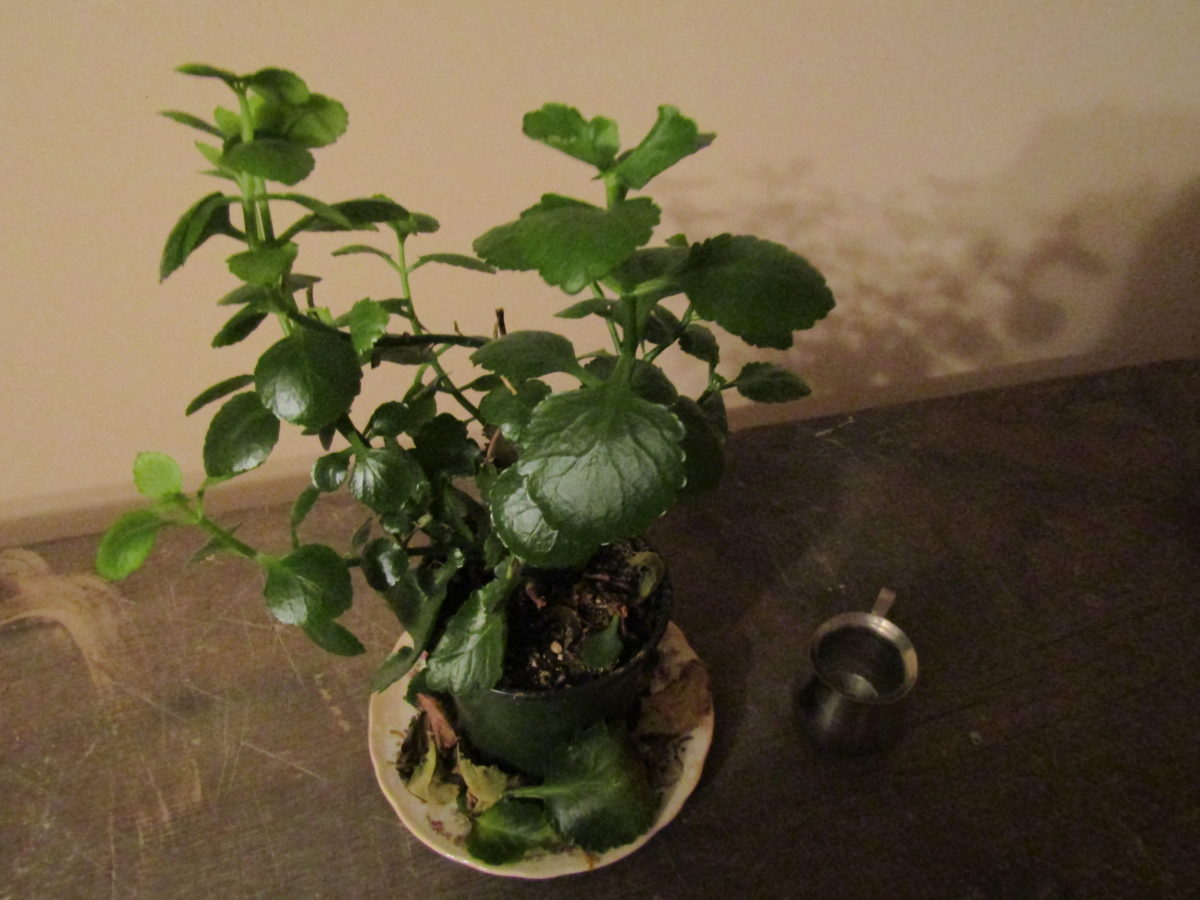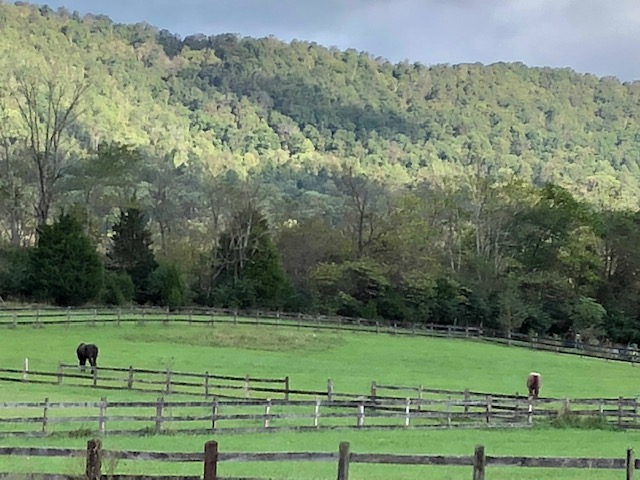Did you notice anything missing? Yep. No picture today. This is what happened. The first morning after turning the clock back, I woke up super early. My internal alarm went off at 4:30 a.m., no kidding. I figured I might as well make hay before the sun shines, so I did. By 6:00 a.m. it was fully light out. I peeked out at the mountain and oh my, what a sight! The sun shining down on the frost caused all to sparkle. It was simply glorious. I told Shenandoah to wake up, we didn’t want to miss the glorious sight. She reluctantly got off her bed. I grabbed my camera. Off we went.
We walked a little and just enjoyed – the sun, the sparkle, the breeze, the colors, the silence, the peace. Sigh. We rounded a corner in the front field and a super bright sparkle caught my eye. I bent down to look at the particularly beautiful sparkle, frost covering a weed. The frost was so thick it made the plant visually multi-dimensional. I know, it sounds weird, I just don’t know how else to describe it to you. It was stunning! I pulled out my camera and zoomed in as close as possible because I wanted you to be able to see it. You could actually see the individual ice crystals. I line it up. It automatically focuses, because I can’t. It is perfect. Snap. My camera lens retracts, the big red battery light comes on and my camera shuts off. Ah!!!!!! That beautiful moment lost forever, except in my mind. It won’t last long there either, I promise. No pictures of the sun shining on the mountain. No pictures of the fall colors. No capture of the breathtaking morning. All because I wasn’t prepared.
Earlier this week I was out in the woods looking for eye-treasurers. I noticed then that my battery was low. I should have charged it days ago. Now a moment in time is lost. I can’t get it back and I can’t share it with you. All because I wasn’t prepared.
I began to wonder, how many moments in time do I miss simply because I am not prepared. Not just picture moments, but real make a difference life-moments. How do I make sure I’m prepared? Prepared to see God in everything? Prepared to tell others of Him? How do I make sure I don’t miss those snapshots of life? How do I make sure I don’t fall prey to the powers of the evil one? How do I make sure I’m prepared for Him?
Wherefore gird up the loins of your mind, be sober, and hope to the end for the grace that is to be brought unto you at the revelation of Jesus Christ. 1 Peter 1:13
There it is! There’s the answer! Gird up the loins, people! Yes! But wait…what does that even mean? To understand the “gird up,” we have to go back a-ways. Moses and Aaron are instructing the people of Israel for The Passover. These instructions came directly from God. Let’s look at Exodus 12:11:
And thus shall ye eat it; with your loins girded, your shoes on your feet, and your staff in your hand; and ye shall eat it in haste: it is the Lord’s Passover. (KJV)
or
Wear your traveling clothes as you eat this meal as though prepared for a long journey. Wear your sandals, and carry your walking sticks in your hands. Eat the food quickly, for this is the Lord’s Passover. (NLT)
Gird up! The fashion of the day for all was a neutral colored flowing robe, accented at the waist by a belt or rope. As you can imagine, a flowing robe could have been a little tricky if you had to move quickly, especially for those of us who get easily tangled up. Girding up the loins meant to pull the back of the robe between your legs and tuck it into your belt in the front, pulling up the flowing material so that you didn’t get tripped up. The belt was not just an accessory, it was a necessity. The first piece of armor mentioned by Brother Paul in Ephesians was the “belt of truth.” Coincidence? I think not. Anyway, God’s message was to be prepared.
“Be dressed for service and well prepared, as though you were waiting for your master to return from the wedding feast. Then you will be ready to open the door and let him in the moment he arrives and knocks. There will be special favor for those who are ready and willing for his return. I tell you, he himself will seat them, put on an apron, and serve them as they sit and eat! He may come in the middle of the night or just before dawn. But whenever he comes, there will be special favor for his servants who are ready. Know this: A homeowner who knew exactly when a burglar was coming would not permit the house to be broken into. You must be ready all the time, for the Son of Man will come when least expected.” Luke 12:35-41
Gird up the loins of your mind. The New Living Translation says to “think clearly and exercise self-control.” I struggle to think clearly and I lack self-control. You too? So, how do we gird up the loins of our minds? How do we ready our minds for action? How do we become more alert? Let’s start with what’s currently in our minds. Is there stuff there that needs to be handled, processed, dealt with and disposed of? Are our minds full, cluttered, so weighted down with the temporal that we can’t even think, let alone think clearly? Sometimes. If we belong to Jesus, thinking clearly and exercising self-control are more difficult. Why? Because those are two things smutty face (as C.S. Lewis calls satan), doesn’t want us to do. Smutty face is in his glory when we are confused and out of control. That means he will do anything to keep us that way. Just look at our lives. Isn’t it obvious? Smutty face does not want us to be prepared. He doesn’t want our minds to be girded or guarded. BUT…
Since you have been raised to new life with Christ, set your sights on the realities of heaven, where Christ sits at God’s right hand in the place of honor and power. Let heaven fill your thoughts. Do not think only about things down here on earth. Colossians 3:1-2
You see, for all time, it’s been about Jesus. His coming to save. All time has prepared us for Him. Are you prepared? Will you miss the once in a lifetime shot to see eternity? Will you miss the opportunity to share eternity with someone else? Will you get tripped up or be girded up?








